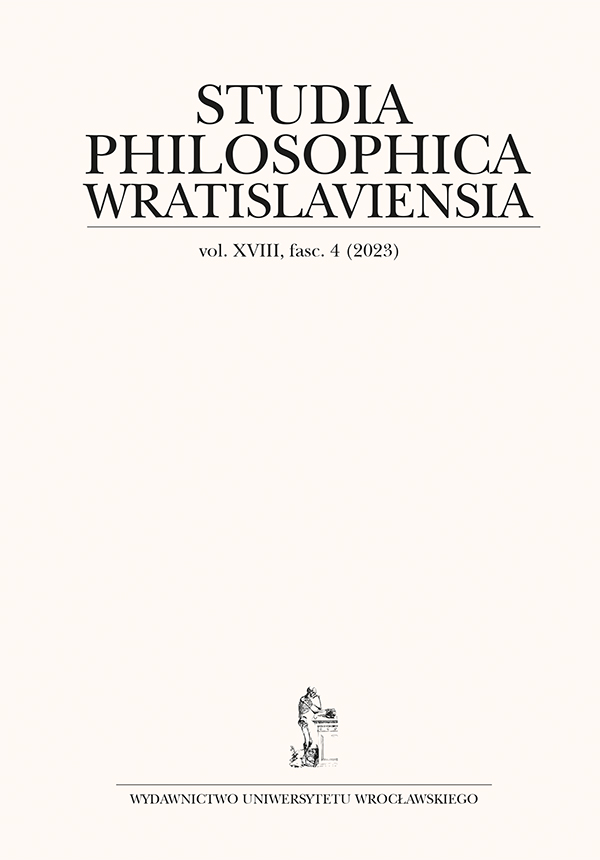

Artykuły

The paper presents the agency of human beings as embodied, i.e. it shows what it means to think about agency as founded on being a body (rather than merely exercised through a body). It is also argued that the free—i.e. reflective and spontaneous—exercise of agency should likewise be understood as embodied. The paper argues that both the appreciation and experience of the free exercise of embodied agency require wonder. The latter is defined as the attitude that facilitates the relationship of familiarization without appropriation. The paper shows how wonder contributes to the experience of freedom related to expressing one’s own unchosen (bodily) difference while relating to the differences of others.
Arendt H., Denktagebuch, 1950–1970, U. Ludz, I. Nordmann (eds.), München–Berlin 2020.
Arendt H., Lectures on Kant’s Political Philosophy, Chicago 1992.
Arendt H., “Letter to Gershom Scholem,” [in:] H. Arendt, The Jew as Pariah: Jewish Identity and Politics in the Modern Age, New York 1978, pp. 245–251.
Arendt H., “Philosophy and Politics,” Social Research 57 [1] (1990), pp. 73–103.
Arendt H., “The Crisis in Culture: Its Social and Its Political Significance,” [in:] H. Arendt, Between Past and Future: Eight Exercises in Political Thought, London 2006, pp. 196–222.
Arendt H., The Human Condition, second edition, Chicago–London 1998 (1958).
Arendt H., The Life of the Mind, vol. 2: Willing, San Diego–New York–London 1971 (1977, 1978).
Arendt H., “Truth and Politics,” [in:] H. Arendt, Between Past and Future: Eight Exercises in Political Thought, London 2006, pp. 223–259.
Barrett S., Waving My Arms in the Air, Parlophone Records Ltd 1993.
Bendik-Keymer J., “Beneficial Relations Between Species & The Moral Responsibility of Wondering,” Environmental Politics (2021), pp. 1–18 [online], doi: 10.1080/09644016.2020.1868818.
Bendik-Keymer J. (with images by M. Morrison), Nussbaum’s Politics of Wonder: How the Mind’s Original Joy is Revolutionary, London–New York–Dublin 2023.
Bendik-Keymer J., “The Other Species Capability & The Power of Wonder,” Journal of Human Development and Capabilities 22 [3] (2021), pp. 154–179, doi: 10.1080/19452829.2020.1869191.
Bendik-Keymer J., “The Reasonableness of Wonder,” Journal of Human Development and Capabilities 18 [3] (2017), pp. 337–355, doi: 10.1080/19452829.2017.1342385.
Butler J., Notes Toward a Performative Theory of Assembly, Cambridge–London 2015.
Castello R., Caputo M., “Thyroid Diseases and Gender,” Ital J Gender-Specific Med 5 [3] (2019), pp. 136–141, doi: 10.1723/3245.32148.
Curtis K., Our Sense of the Real: Aesthetic Experience and Arendtian Politics, Ithaca–London 1999.
Descartes R., “The Passions of the Soul,” Early Modern Texts (2023), https://www.earlymoderntexts.com/assets/pdfs/descartes1649part2.pdf (accessed: 4.06.2023).
de Beauvoir S., The Second Sex, transl. C. Borde, S. Malovany-Chevallier, New York 2010.
Hoły-Łuczaj M., “Others in My Aging (Confronting de Beauvoir, Malabou, and Heidegger to Make Sense of Aging),” Studia Philosophica Wratislaviensia 18 [3] (2023), pp. 11–27, doi: 10.19195/1895-8001.18.4.2.
Honig B. (ed.), Feminist Interpretations of Hannah Arendt, Pennsylvania 1995.
Irigaray L., An Ethics of Sexual Difference, transl. C. Burke, G. C. Gill, Ithaca 1993 (1984).
Kant I., The Critique of Judgment, transl. W.S. Pluhar, Indianapolis–Cambridge 1987.
Lykke N., “Making Live and Letting Die: Cancerous Bodies Between Anthropocene Necropolitics and Chtulucene Kinship,” Environmental Humanities 11 [1] (2019), pp. 108–135, doi: 10.1215/22011919-7349444.
Malabou C., Pleasure Erased: The Clitoris Unthought, transl. C. Shread, Cambridge 2022.
Mann B., “Feminist Phenomenology and the Politics of Wonder,” Avant IX [2] (2018), pp. 43–61, doi: 10.26913/avant.2018.02.03.
The Milan Women’s Bookstore Collective, Sexual Difference: A Theory of Social-Symbolic Practice, transl. P. Cicogna, T. De Lauretis, Bloomington–Indianapolis 1990 (1987).
Mulder J.E., “Thyroid Disease in Women,” Women’s Health Issues 82 [1] (1998), pp. 103–125.
Nussbaum M.C., Frontiers of Justice Disability, Nationality, Species Membership, Cambridge–London 2007 (2006).
Nussbaum M.C., Justice for Animals: Our Collective Responsibility, New York 2023.
Nussbaum M.C., Women and Human Development: The Capabilities Approach, New York 2000.
Parker E.A., Elemental Difference and the Climate of the Body, New York 2021.
Plato, Theaetetus, transl. B. Jowett, 2023, https://www.gutenberg.org/files/1726/1726-h/1726-h.htm (accessed: 4.06.2023).
Qiu Y. et al., “Birth Control Pills and Risk of Hypothyroidism: A Cross-Sectional Study of the National Health and Nutrition Examination Survey, 2007–2012,” BMJ Open (2021), doi: 10.1136/bmjopen-2020-046607.
Sartre J.-P., Being and Nothingness: An Essay on Phenomenological Ontology, transl. H.E. Barnes, New York 1956.
Sjöholm C., Doing Aesthetics with Arendt: How to See Things, New York 2015.
Torre F. et al., “Effects of Oral Contraceptives on Thyroid Function and Vice Versa,” Journal of Endocrinological Investigation 43 (2020), pp. 1181–1188, doi: 10.1007/s40618-020-01230-8.
Young I.M., “Asymmetrical Reciprocity: On Moral Respect, Wonder, and Enlarged Thought,” [in:] Judgment, Imagination and Politics: Themes from Kant and Arendt, R. Beiner, J. Nedelsky (eds.), Lanham–Oxford 2001, pp. 205–228.
Young I.M., “Throwing Like a Girl: A Phenomenology of Feminine Body Comportment, Motility and Spatiality,” Human Studies 3 (1980), pp. 137–156.
Zerilli L.M.G., A Democratic Theory of Judgment, Chicago–London 2016.
Zerilli L.M.G., Feminism and the Abyss of Freedom, Chicago–London 2005.